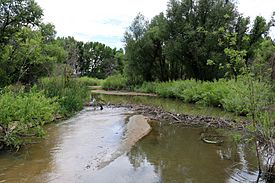Plum Creek (Douglas County, Colorado) facts for kids
Quick facts for kids Plum Creek |
|
|---|---|

The creek just before it empties into Chatfield Reservoir
|
|
| Country | United States |
| State | Colorado |
| County | Douglas County |
| Physical characteristics | |
| Main source | Confluence of West Plum Creek and East Plum Creek Sedalia, Colorado |
| River mouth | Chatfield Reservoir Douglas County, Colorado 5,430 ft (1,660 m) 39°33′23″N 105°3′40″W / 39.55639°N 105.06111°W |
| Basin features | |
| Progression | South Platte—Platte—Missouri—Mississippi |
Plum Creek is a stream located in Douglas County, Colorado. It starts when two smaller creeks, West Plum Creek and East Plum Creek, join together. This meeting point is near Sedalia, Colorado.
Before the Chatfield Reservoir was built in the 1960s and 1970s, Plum Creek flowed into the South Platte River. Now, it flows directly into the southern part of Chatfield Reservoir. This happens near Santa Fe Drive, inside Chatfield State Park.
A project called the Chatfield Storage Reallocation Project began in 2017. It will make Chatfield Reservoir bigger. The water level will rise by about 12 feet. This means the end of Plum Creek will move further upstream. The project also includes work to manage extra dirt and erosion in Plum Creek. This is caused by more water runoff from nearby towns.
How Plum Creek Influences Local Names
The three creeks in the area have given their names to many places. You can find roads, businesses, and other features named after them. For example, there's Plum Creek Parkway in Castle Rock. You can also find the East Plum Creek Trail. The Plum Creek Golf Club in Castle Rock is another example.
The Great Flood of 1965
Plum Creek experienced a huge flood in 1965. It was one of the biggest floods ever recorded there. On June 16, over 14 inches of rain fell in less than four hours. This happened in a small area of the Plum Creek watershed.
The creek, the South Platte River, and the city of Denver all faced terrible flooding. The amount of water flowing in Plum Creek was much higher than expected. It was two to four times more than what was considered a "500-year flood." A 500-year flood is an event that has a 0.2% chance of happening in any given year.
 | Janet Taylor Pickett |
 | Synthia Saint James |
 | Howardena Pindell |
 | Faith Ringgold |

